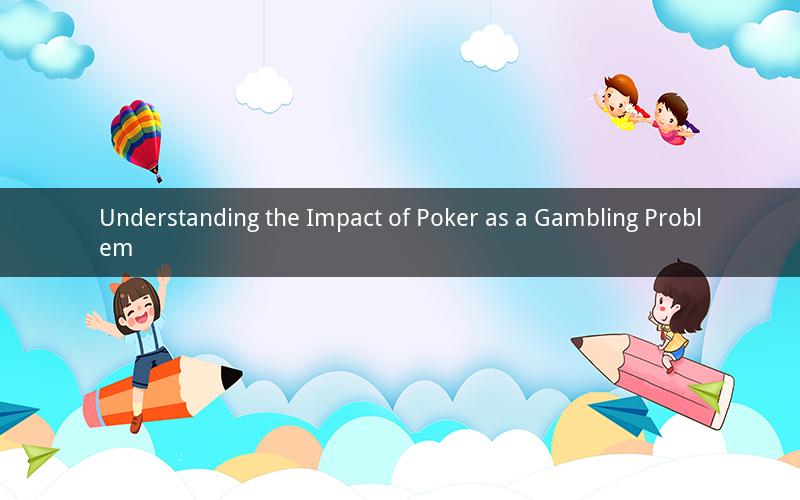
Introduction:
Poker, a popular card game, has gained immense popularity over the years. While it is often considered a form of entertainment, some argue that it can be classified as a gambling problem. This article explores the various aspects of poker as a gambling issue, its consequences, and the signs of problematic gambling behavior.
1. Defining Poker as a Gambling Problem:
Poker is a game of skill, strategy, and chance. However, it involves betting and the potential for financial gain, which raises questions about its classification as a gambling problem. To determine whether poker can be considered a gambling problem, it is crucial to understand the key characteristics of gambling addiction.
1.1 The Definition of Gambling Addiction:
Gambling addiction, also known as compulsive gambling, is a progressive condition characterized by an uncontrollable urge to gamble despite negative consequences. Individuals with gambling addiction often experience cravings, loss of control, and difficulties in stopping their gambling behavior.
1.2 Poker and the Characteristics of Gambling Addiction:
While poker requires skill and strategy, it also possesses several elements that can contribute to gambling addiction. These include:
- Betting money: Poker involves betting real money, which can lead to financial problems and the potential for financial gain.
- Risk-taking behavior: The competitive nature of poker encourages individuals to take risks, which can lead to excessive betting and financial loss.
- Escalating stakes: As individuals become more engrossed in the game, they may increase their stakes, leading to higher financial risks.
- Emotional and psychological factors: Poker can evoke intense emotions and feelings of excitement, making it challenging for some individuals to stop playing even when faced with negative consequences.
2. The Consequences of Problematic Poker Gambling:
Problematic poker gambling can have severe consequences on an individual's personal, financial, and social life. Here are some of the key consequences:
2.1 Financial Consequences:
Gambling problems often result in significant financial loss. Poker gamblers may go into debt, face legal issues, and experience financial ruin due to their addiction.
2.2 Personal and Emotional Consequences:
Problematic poker gambling can lead to strained relationships, loss of self-esteem, and feelings of guilt or shame. Individuals may experience increased stress, anxiety, and depression as a result of their addiction.
2.3 Social Consequences:
Gambling addiction can disrupt social relationships and lead to social isolation. Individuals may avoid family and friends, miss work or school, and neglect their responsibilities due to their gambling habits.
3. Identifying Signs of Problematic Poker Gambling:
Recognizing the signs of problematic poker gambling is crucial in seeking help and support. Here are some common signs:
3.1 Preoccupation with Poker:
Spending excessive time and energy on poker, planning when and where to play, or thinking about poker even when not playing.
3.2 Inability to Control Poker Behavior:
Feeling compelled to play poker, despite promises to stop or reduce gambling, or experiencing frustration when unable to do so.
3.3 Emotional and Psychological Symptoms:
Experiencing mood swings, irritability, anxiety, or depression as a result of poker gambling.
3.4 Financial and Social Consequences:
Encountering financial problems, experiencing relationship difficulties, or neglecting responsibilities due to poker gambling.
4. Treatment and Support for Problematic Poker Gambling:
If someone is struggling with problematic poker gambling, seeking help and support is essential. Here are some treatment and support options:
4.1 Professional Help:
Seeking the assistance of a mental health professional or a therapist specializing in gambling addiction can be beneficial. They can provide individualized treatment plans and support throughout the recovery process.
4.2 Self-help and Support Groups:
Joining support groups, such as Gamblers Anonymous, can provide individuals with a sense of community and support from others who have experienced similar challenges.
4.3 Financial Counseling:
Working with a financial counselor can help individuals manage their finances, create budgets, and address the financial consequences of problematic poker gambling.
5. Conclusion:
Poker, while a popular and entertaining game, can be considered a gambling problem for some individuals. Recognizing the signs of problematic poker gambling and seeking help and support are crucial in overcoming this addiction. By understanding the consequences and treatment options available, individuals can take steps towards a healthier and more fulfilling life.
Questions and Answers:
1. Can playing poker occasionally be considered a gambling problem?
Answer: No, playing poker occasionally does not necessarily constitute a gambling problem. It is only when it becomes compulsive and starts to negatively impact an individual's life that it can be considered a problem.
2. How can I differentiate between harmless poker gaming and problematic poker gambling?
Answer: Differentiating between harmless poker gaming and problematic poker gambling involves assessing whether the poker activity is causing negative consequences, such as financial difficulties, strained relationships, or emotional distress.
3. Are there any specific age restrictions for playing poker?
Answer: Yes, there are age restrictions for playing poker. The legal age for gambling varies by country and jurisdiction, but it is generally considered that individuals must be of legal gambling age to participate in poker games.
4. Can poker addiction be treated successfully?
Answer: Yes, poker addiction can be treated successfully. With proper support and intervention, individuals can overcome their addiction and learn to manage their gambling behavior.
5. Are there any alternative forms of therapy for poker addiction other than traditional therapy?
Answer: Yes, there are alternative forms of therapy available for poker addiction, such as cognitive-behavioral therapy (CBT), mindfulness techniques, and support groups. These alternative approaches can complement traditional therapy and help individuals in their recovery journey.